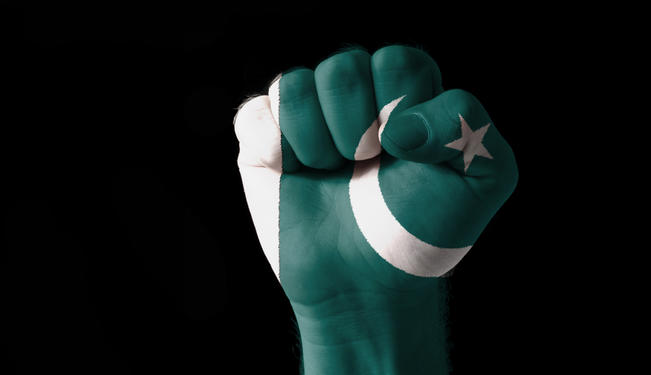
As Pakistanis head to the polls, the elections could mark the first democratic transition between two elected governments in the country’s history.
Background
As the general elections 2013 commence, fear is mingled with hope and resilience in Pakistan. The streets of the major cities and the small towns are draped with political banners, each showcasing its own election symbol — a tiger, an arrow, a kite or a cricket bat. While former President Pervez Musharraf has been pushed out of the political scene after his dramatic house arrest two weeks prior to the elections, new political forces have entered the battlefield, whether through slogans of “Naya (New) Pakistan” led by the cricketer-turned politician Imran Khan, or as independent candidates contesting without the baggage of party politics. Indeed, the general elections also mark the first time that an independent transgender candidate is also contesting the polls in Pakistan.
On the other hand, political violence may not be a stranger to the country, but in the run-up to the elections a different kind of threat seems to have taken root. A series of attacks have been carried out against political candidates (and their offices) in Pakistan’s largest city, Karachi, as well as in parts of the country by groups such as the Tehrik-e-Taliban Pakistan (TTP) in an attempt to disrupt the vote. Notwithstanding the threat of insecurity, many citizens are determined to see through the end of the elections. Others watch with bated breath the outcome of what can potentially be the first civilian to civilian transfer of power in Pakistan.
From the time of its independence in 1947 until 1970, Pakistan witnessed no general elections owing to disputes over the constitution in the first fifteen years of the fledgling republic, followed by a military dictatorship of General Ayub Khan in 1958. It was not until 1970 that Pakistan saw its first free and fair general elections, only to herald one of the biggest political crises faced by the state, and an eventual secession of East Pakistan after the majority vote to the Awami League Party was denied. When in 1977, Zulfiqar Ali Bhutto from the Pakistan People’s Party (PPP) held elections, the results were marred by allegations of rigging while a nine-party alliance launched a movement against his government. That same year, General Zia ul Haq toppled Bhutto’s government in a military coup, as party-less ballots dominated the political landscape for the next eleven years.
Elections in November 1988 saw the rise of the PPP, now under the leadership of Zulfiqar Bhutto’s daughter, Benazir Bhutto. But only twenty months later, she was sacked by President Ghulam Ishaq Khan over allegations of corruption. In the ensuing years, a power struggle erupted between Bhutto, her rival, Nawaz Sharif, and Ishaq Khan. Sharif's Pakistan Muslim League swept to power during the elections in 1997, but soon developed differences with the army chief General Pervez Musharraf. In a dramatic standoff in October 1999, the army toppled Sharif’s government when he refused to allow the army chief’s plane to land in Pakistan after a foreign visit. With Sharif sent into exile in Saudi Arabia, Musharraf took the reign as the chief executive — and after three years, as the president. In 2007, he got himself re-elected as the president after sacking the judiciary and imposing a state of emergency. But this time, the tide had turned against him. The state of emergency, sparking widespread protests, marked the beginning of his fall. The same year, following the announcement of the next elections, former prime minister, Benazir Bhutto, was assassinated. In the aftermath of her assassination, the PPP swept the largest number of seats in the National Assembly, bringing in the recently-widowed Zardari as the party’s co-chairman. Yousuf Raza Gilani took oath as the prime minister and Zardari took office as the country’s president.
Why are the Pakistani Elections Significant?
The significance of the general elections 2013 becomes all the more prominent when Pakistan’s chequered electoral history is taken into context, punctured by military coups, pre-poll rigging and corruption charges disrupting the tenures of elected governments.
For the first time in Pakistan’s beleaguered political landscape, a civilian, democratically-elected government completed its five-year term on March 16, 2013, and handed the reins of governance to a caretaker government until the vote. Today, Pakistan faces a myriad of challenges — from a near bankrupt treasury to an omnipresent threat of homegrown terrorism. But simultaneously, Pakistan stands on the cusp of change. The elections of May 11, 2013, could mark the first successful democratic transition between two elected governments in Pakistan’s history. If successful, it could set right the country’s tarnished political legacy by tilting the balance in favour of civilian rule and by sowing the seeds of democracy in the country.
Image: Copyright © Shutterstock. All Rights Reserved
For more than 10 years, Fair Observer has been free, fair and independent. No billionaire owns us, no advertisers control us. We are a reader-supported nonprofit. Unlike many other publications, we keep our content free for readers regardless of where they live or whether they can afford to pay. We have no paywalls and no ads.
In the post-truth era of fake news, echo chambers and filter bubbles, we publish a plurality of perspectives from around the world. Anyone can publish with us, but everyone goes through a rigorous editorial process. So, you get fact-checked, well-reasoned content instead of noise.
We publish 2,500+ voices from 90+ countries. We also conduct education and training programs on subjects ranging from digital media and journalism to writing and critical thinking. This doesn’t come cheap. Servers, editors, trainers and web developers cost money.
Please consider supporting us on a regular basis as a recurring donor or a sustaining member.
Support Fair Observer
We rely on your support for our independence, diversity and quality.
Will you support FO’s journalism?
We rely on your support for our independence, diversity and quality.








